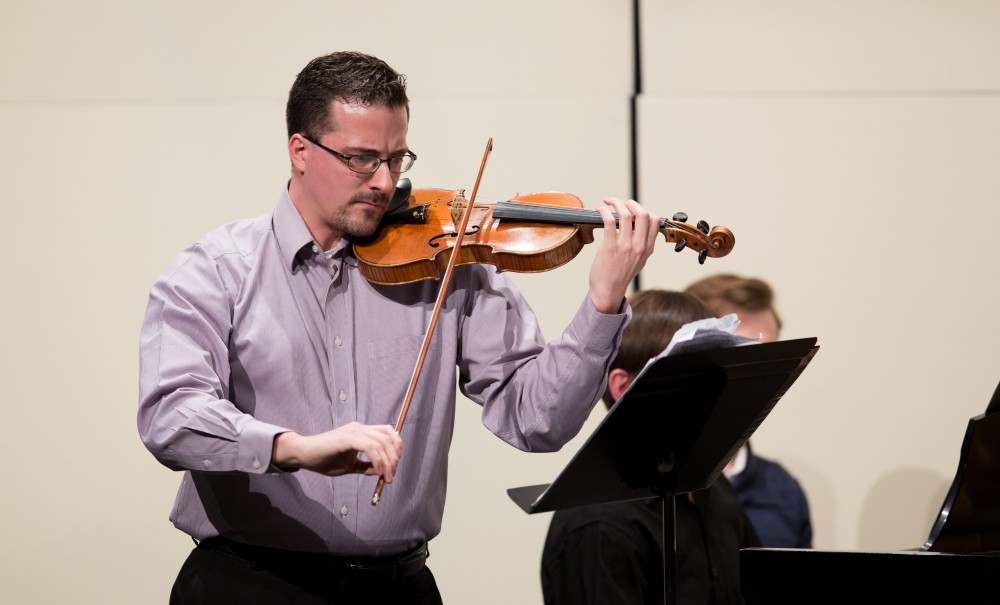Alumnus Andrew Uhe: Life After Graduation

GVL / Kevin Sielaff – Andrew Uhe, former Grand Valley student, performs in the Louis Armstrong Theatre Jan. 14, 2016. Uhe, a native of West Michigan, currently lives in Texas where he performs with the symphony orchestras located in Victoria and Corpus Christi.
Jan 18, 2016
From classes to late night studying, university life may sometimes feel like living in a bubble that’s disconnected from reality. But after his recent return to Grand Valley State University, a violinist and GVSU alumnus said he hopes that students will see, hear and feel how their intentions, perspectives and achievements can influence the future.
A graduate of GVSU’s class of 2003, Andrew Uhe has played the violin locally, nationally and abroad. He is currently working toward his doctorate at the University of Iowa while also teaching violin and music appreciation at Laredo Community College in Texas. Uhe said the idea of inspiration is especially important to his teaching style.
“Inspiration: as a teacher that’s my primary goal,” Uhe said. “To open students to the possibilities of life, because if we don’t look for them they’ll just pass us by. In this moment there are possibilities, and that inspiration is so crucial.”
Uhe said that attending arts events around campus is also a great way for students to become inspired. During one such event on Jan. 15 at GVSU, Uhe performed alongside Russian pianist Sasha Burdin for a recital featuring pieces by Alfred Schnittke and Ottorino Resphigi.
Professor Pablo Mahave-Veglia, who organized the recital, said he invited Uhe to GVSU for the benefit it would offer students.
“It shows our students that somebody that has a good deal of musical talent like they do, and (who has) developed this as an intellectual pursuit like they’re trying to do, can come out of the other end and contribute to our discipline,” Mahave-Veglia said. “That’s a very high compliment, where you’re not only serving yourself or finding some justice to the music, but you’re really contributing to the discipline. It’s one of the demands that we have of musicians in the future: to not just play the pieces, but to become advocates.”
Uhe said that his own relationship and training with music began when he was three, but evolved over time. Uhe said his mother initially made him learn music, and that this was a task he didn’t fully accept until he was 15.
“There is a sense of a comfort (and) solace that one can find in playing or studying music. It can be an escape,” he said. “When I finally recognized the potential for music to communicate my own experiences and developed a love for pieces that I wanted to share with people, that’s when it becomes no longer work; it becomes what you have to do to become heard and understood.”
During his teaching career, Uhe has worked with students ranging from the retired to those as young as five years old. He said that teaching a diversity of students has helped him develop as a musician.
“Every student has their own interest and personality and challenges,” Uhe said. “I think that helps keep things fresh for me. I learn a lot from their struggles and experiences. I don’t really buy into the model of the teacher as this authoritative dictator who has complete mastery over whatever we’re going to deal with. I’m quite open about what I don’t know and try to be more of a learning model for my student.”
In particular, Uhe said that what he has learned through teaching has helped him when memorizing challenging or lengthy pieces of music.
“It’s about having a memorable experience, which is what I think any great teacher is able to do: to pull students into the moment to give them an experience that is memorable, meaningful and insightful,” he said. “That’s a practice I try to apply. When I encounter the challenge of a piece that is hard to memorize, then I need to start developing relationships with that score that are memorable.“
Uhe said he would advise students and recent graduates to always remain open to the opportunities in the world around them.
“Stay in touch with your intentions, and commit yourself to realizing those intentions,” he said. “The world isn’t always what you expect, and always look at things with a positive perspective. We don’t know what to expect, and we’ll always have a rewarding experience if we’re open to inspiration and the possibilities that we find in the moment.”






















